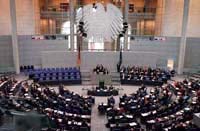
Germany's new parliament sat for the first time yesterday even as the incoming coalition government tries to put together a policy programme.
Exactly one month after dramatic elections threw Germany into political chaos, the 614 newly elected lawmakers met in the Bundestag, the lower house of parliament.
The sitting, which had to take place within 30 days of the election, marked the official end of Chancellor Gerhard Schroeder's seven years in power, although he will continue to take care of state business until his successor, the conservative Angela Merkel, is in place.
Merkel completed her cabinet line-up on Monday, naming conservative ministers including one of her fiercest political rivals, Horst Seehofer, to ministerial posts.
The leader of the powerful state of Bavaria, Edmund Stoiber, will take the job of economy minister while the experienced Wolfgang Schaeuble was chosen to return to the interior ministry after a gap of 14 years.
The defence minister's role will be filled by Franz Josef Jung, a leading Christian Democrat in the state of Hesse whose career recovered after he resigned over a party funding scandal in 2000.
Merkel was forced to bow to pressure from the Bavarian sister party of her Christian Democratic Union to make Horst Seehofer, an influential liberal among the conservatives, agriculture minister.
Seehofer had infuriated Merkel by opposing her proposals for radical reform of the health insurance system, but his nomination was strongly backed by Stoiber, who leads the Bavarian conservatives.
The Social Democrats, who will take eight cabinet posts in the government, named their ministers last week, including party leader Franz Muentefering as vice-chancellor.
The former right-hand man of Schroeder, Frank-Walter Steinmeier, will be foreign minister, and Peer Steinbrueck, the former premier of the state of North Rhine-Westphalia, will be finance minister.
The cabinet of Christian Democrats and Social Democrats has begun four weeks of complex negotiations to hammer out a joint government programme. The Bundestag is expected to sit in mid-November to formally elect Merkel as chancellor.
The oldest member of the Bundestag, the 73-year-old outgoing Interior Minister Otto Schily, gave a speech calling on the new deputies to restore "optimism, self-confidence and trust" in the political process among Germans who saw their leaders squabble for two weeks following the election before a compromise was found.
As Merkel and Schroeder looked on, Schily urged the members of parliament to "stop trying to score political points" and pull together for the good of a country struggling with high unemployment and low economic growth.
Norbert Lammert, an experienced Christian Democrat who has been a member of parliament for 25 years, was overwhelmingly elected its new speaker to replace the Social Democrat Wolfgang Thierse.
Merkel's Christian Democratic Union and their Bavarian sister party, the Christian Social Union, have 226 seats, just four more than Schroeder's Social Democrats. Schroeder retains a seat in the Bundestag.
The German press yesterday predicted problems ahead for Merkel following the nomination of Seehofer to the agriculture ministry. Some newspapers said Seehofer was likely to side with the eight Social Democrat ministers in the government in opposing large-scale reforms.
(China Daily October 19, 2005)
|

